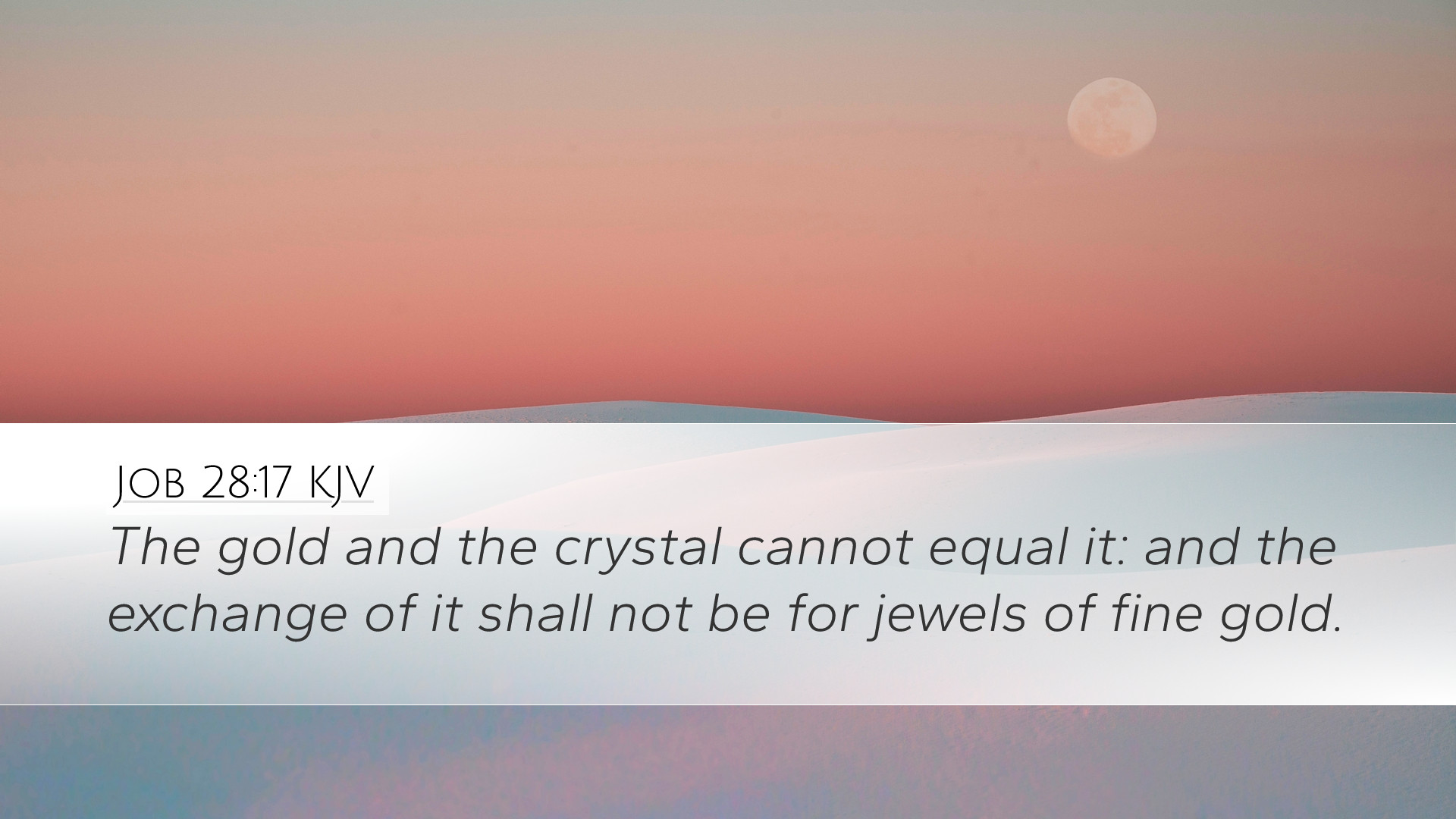Old Testament
Genesis Exodus Leviticus Numbers Deuteronomy Joshua Judges Ruth 1 Samuel 2 Samuel 1 Kings 2 Kings 1 Chronicles 2 Chronicles Ezra Nehemiah Esther Job Psalms Proverbs Ecclesiastes Song of Solomon Isaiah Jeremiah Lamentations Ezekiel Daniel Hosea Joel Amos Obadiah Jonah Micah Nahum Habakkuk Zephaniah Haggai Zechariah MalachiJob 28:17
Job 28:17 KJV
The gold and the crystal cannot equal it: and the exchange of it shall not be for jewels of fine gold.
Job 28:17 Bible Commentary
Commentary on Job 28:17
Verse: Job 28:17 - “Wisdom is better than rubies; and all the things that may be desired are not to be compared to it.”
Introduction
The Book of Job delves into profound themes concerning suffering, divine wisdom, and the nature of God. Job 28 serves as a poignant interlude where Job reflects on the preciousness of wisdom, personifying it and contrasting it with worldly treasures. This commentary aims to extract insights from prominent public domain sources including Matthew Henry, Albert Barnes, and Adam Clarke, emphasizing the theological and practical implications of this verse.
Contextual Analysis
Job 28 is a unique chapter within the book, addressing the quest for wisdom. It highlights various aspects of humanity’s pursuit of knowledge and understanding. In the preceding verses, Job articulates the lengths to which people go to mine precious metals and gems, signifying their value. In this context, verse 17 serves as a climax asserting that despite the worth of earthly treasures, wisdom is incomparable.
Commentary Insights
Matthew Henry’s Perspective
Matthew Henry remarks on the transaction between earthly pursuits and spiritual treasures, emphasizing that while rubies and other gems possess value, they pale in comparison to wisdom. Henry notes that wisdom is portrayed as a treasure that cannot be procured through human effort alone; it is a divine gift. He states, “It is the highest privilege of man to have wisdom, which consequently must be sought from God.” This emphasizes the necessity of divine revelation and the humble posture of the seeker.
Albert Barnes’ Insights
Albert Barnes elaborates on the phrase concerning the worth of wisdom relative to material wealth. He emphasizes that wisdom embodies understanding and moral integrity, qualities that surpass transient earthly desires. Barnes notes, “Men may desire wealth and honor, but they should understand that these are fleeting; it is wisdom that grants enduring life and true satisfaction.” He further posits that this verse serves as a reminder that priorities need to be aligned towards the eternal rather than the temporal.
Adam Clarke’s Analysis
Adam Clarke provides a more doctrinal interpretation, asserting that wisdom as understood in this verse refers not only to intellectual knowledge but also to spiritual discernment. Clarke states, “The knowledge of God and the application of Scripture are where true wisdom resides.” He warns against the folly of obfuscating wisdom with mere knowledge, indicating that many learn many facts yet remain devoid of true understanding or wisdom.
The Value of Wisdom
At the heart of Job 28:17 lies the assertion that the true measure of value is wisdom. While rubies are precious, they can be lost, stolen, or destroyed. In contrast, wisdom fortifies character, guides decisions, and provides spiritual richness throughout life. This aligns with the broader biblical narrative that elevates wisdom, echoing proverbs such as Proverbs 3:15, which exhorts, “She is more precious than rubies: and all the things thou canst desire are not to be compared unto her.”
The Divine Source of Wisdom
Job 28 highlights the theme that human attempts to procure wisdom are ultimately fruitless without divine intervention. This chapter illustrates man's limitations in discovering the depths of wisdom through natural means. Reflecting on this, Matthew Henry insists, “None but God can reveal the deep things; only He knows the way to wisdom.” This assertion underscores the importance of prayer, reflection, and reliance on divine guidance in the acquisition of true wisdom.
Practical Application
- Seek Divine Wisdom: Believers are encouraged to actively seek wisdom through prayer and studying the Scriptures, recognizing it as a gift from God.
- Value Over Wealth: Individuals should re-evaluate their pursuits, placing a higher priority on wisdom than on material wealth, understanding that wisdom brings eternal value.
- Discernment in Choices: The pursuit of wisdom leads to better decision-making. Every aspect of life can benefit from an approach rooted in wisdom rather than mere knowledge.
Conclusion
Job 28:17 masterfully encapsulates the essential truth that wisdom transcends all material wealth. It challenges the reader to reflect on their values and pursuits, urging a shift towards seeking the divine wisdom that leads to life’s ultimate fulfillment. The insights gleaned from revered commentators not only enrich our understanding but serve as a profound reminder of wisdom’s unparalleled significance in the life of a believer.


